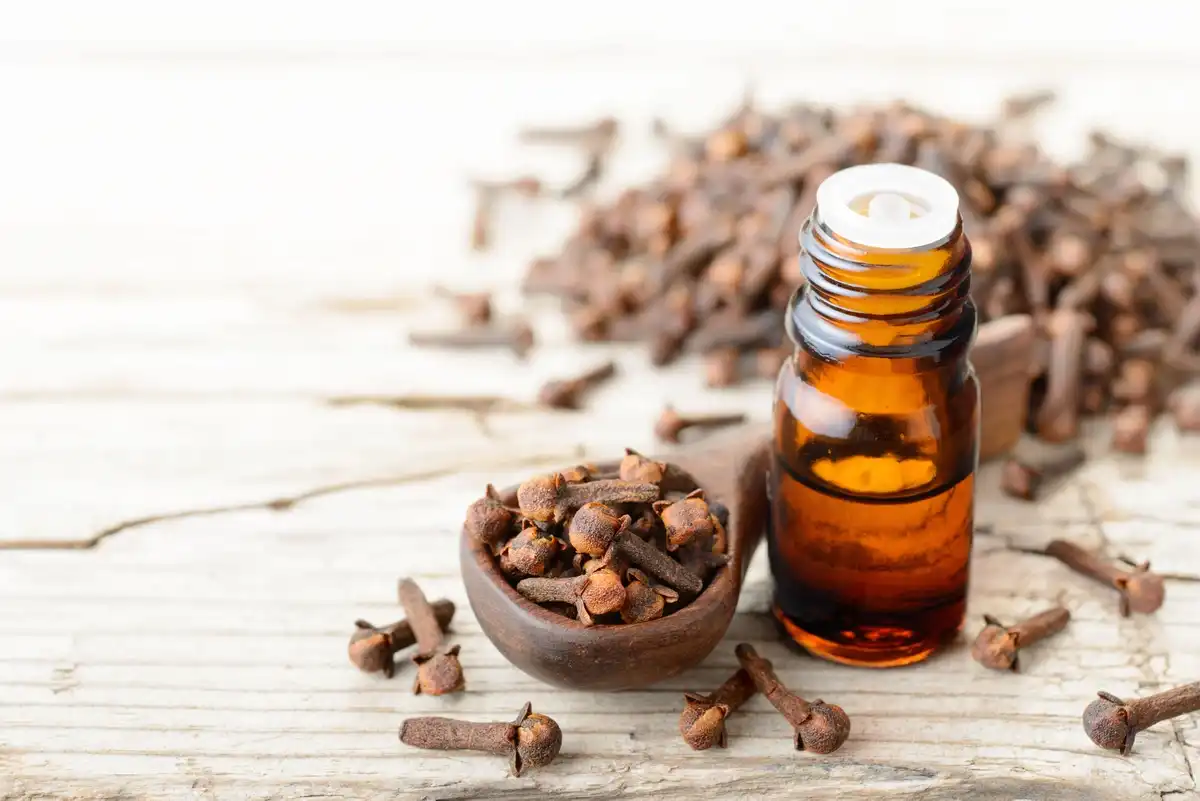Does Clove Oil Really Work for Toothaches?


Thinking of using clove oil for toothache symptoms? Clove essential oil for tooth pain has been a homeopathic remedy for years. Believe it or not, oil of cloves is still used in many dental materials you’ll find inside of your dentist’s office.
It’s not that they’re using it to treat toothaches, but the oil does provide some analgesic relief to help soothe sensitive teeth and gums during certain types of restorative procedures.
Toothache Relief
As a natural analgesic, it’s both safe and effective. In fact, there have even been studies comparing it to other types of topical pain relievers and found the clove oil (toothache uses) were just as effective.
How Does Clove Oil Work For Relief?
It just so happens that the eugenol inside of clove oil (eugenol extract) is a natural anti-inflammatory. You can use clove oil for toothache relief just as easily as you could take a couple of Motrin. The only difference is that you’re applying it topically instead of ingesting it.

How To Use Clove Oil For A Toothache
Some people will physically chew on dried cloves or create a type of “mash” with clove powder to apply directly to their gums or tooth. But the better option is to use pure clove oil when possible.
Here’s how to use clove oil for toothache or gum symptoms:
Since you typically don’t want to apply concentrated essential oil directly onto sensitive skin (like your gums or inside of your cheek) a safe way to apply it is to use a carrier oil, such as olive oil, coconut oil, or something similar. Use the carrier oil as a base (1/2 to 1 teaspoon is more than enough) and then apply a few drops of clove oil, mixing it thoroughly.
Use a cotton swab or cotton ball to absorb the diluted oil and apply it directly to the area that’s in pain. If you prefer, you can saturate the cotton ball and then put it in your mouth (directly over the tooth that hurts) for several minutes at a time, discarding it after each use.
Repeat every few hours as needed.
NOTE: If for any reason you experience burning sensations, use more carrier oil and less clove oil. In rare circumstances, people may experience a clove oil allergy and should discontinue using it immediately.
Is Clove Oil Really Effective?
The eugenol product was proven to be effective for:
- Pain relief
- Reduced inflammation
- Lower infection rates
Herbal-based mouth rinses that contain clove oil can also serve as safe antimicrobials. However, they’re still less effective against dental plaque than prescription-strength solutions that you get from your dentist.
If you’re currently in the holding stages of trying to reverse gingivitis and prevent the onset of periodontal disease, incorporating clove oil to treat sensitive gums or inflammation may be beneficial. The antibiotic tendencies of the eugenol are thought to potentially be useful against the bacteria that cause periodontal disease as well as tooth decay.
One of the reasons why dental materials — such as bonding agents or dental cement —contain clove oil is because of the antioxidative properties. When a restoration like a dental crown is being placed immediately next to gums that are injured, sensitive, or swollen, the eugenol inside of the bonding agent offers anti-inflammatory advantages to ease discomfort following the treatment.
Is Clove Oil Safe?
Do NOT use clove oil on infants or young children, because some reports suggest that it can potentially damage the developing pulp (nerve tissues) inside of their still-growing teeth.
Even when something is “healthy”, too much of a good thing can be bad. Including water. When in doubt, always consult with your doctor or dentist.
Risks & Side Effects From Clove Oil
Aside from the risk of permanent nerve damage to children’s teeth, there are some reports that children have been poisoned by accidentally becoming exposed to toxic levels of essential oils, such as clove oil. Usually, the poisoning occurs because of ingesting or inhaling it into the lungs, but excessive absorption can also be caused by topical applications.
Applying concentrated clove oil directly to your gums or tooth could cause burning sensations. Remember to dilute it. If you’ve never used clove oil before, consider applying it to the back of your hand or another test area to rule out any potential allergies before placing it onto highly sensitive tissues inside of your mouth. If you itch or break out in a rash, discontinue using it immediately and take an antihistamine medication such as Benadryl.
10 Remedies To Relieve Toothache
Looking for an alternative to clove oil for toothache relief? Here are some other common DIY options:
1) OTC Pain Meds
Anti-inflammatory medications like ibuprofen (Motrin) naturally ease tooth pain better than others because of their ability to reduce swelling in dental nerves and oral tissues. Take them as directed.
2) Saltwater Rinse
Warm saltwater naturally draws out inflammation in mucosal tissues (like those inside of your mouth) to ease swelling. Dilute one teaspoon of table salt in an 8 oz. glass of slightly warm water. Rinse vigorously and repeat every few hours as needed.
3) Hydrogen Peroxide Rinse
Typically, you don’t want to rinse with hydrogen peroxide very often because it can alter the natural flora inside of your mouth. Combine one part of 3% hydrogen peroxide with two parts water. Gargling for 60 seconds. Spit the solution.
4) Cold Compress
Applying a cold compress on and off 20 minutes at a time can reduce swelling. It’s typically recommended following surgery such as wisdom tooth removal.
5) Peppermint Tea Bags
Regular black tea bags or peppermint tea bags can be applied to sore gums following surgery or dental extractions. Tea can help with coagulation and faster healing and peppermint eases irritated tissues.
6) Garlic
As long as you’re not afraid of scaring anybody off with bad breath, garlic is another natural anti-inflammatory. Depending on how much you can tolerate, you can mix up a paste and press it against the side of your tooth.
7) Vanilla Extract
Since it contains alcohol, vanilla extract might provide temporary pain relief when diluted and applied to sore gums. But it also contains sugars, so it can increase your risk of tooth decay.
8) Guava Leaves
If you just so happen to have a guava plant sitting around, you can chew on the leaves for immediate but short-term pain relief. Some people even boil them and add salt for a DIY mouth rinse.
9) Wheatgrass
Similar to guava leaves, you can chew on wheatgrass or make a rinse out of it. The anti-microbial properties come from chlorophyll, which can help reduce swelling.
10) Thyme
Some people say that using thyme on a cotton ball instead of clove oil is just as helpful for managing tooth pain. It’s both an antioxidant and has antimicrobial properties.
When To Talk To Your Dentist
If your toothache is because of a cavity, gum recession, or dental abscess, no amount of clove oil or other DIY dental remedy is going to help. Waiting for the symptoms to go away isn’t a good indicator of the severity of your oral infection. If symptoms persist for more than a few days and you know it’s not something temporary (like food stuck under your gums or a cold sore) it’s important to see your dentist. Earlier dental treatments mean smaller and more affordable options, as opposed to waiting on things to get worse.
Decay, periodontal disease, and abscessed teeth are common oral diseases that will simply continue to worsen if allowed to go untreated. They don’t resolve with time or home care. Masking the symptoms with something like clove oil could actually do more harm than good. Make sure you stay up to date on your six-month checkups but if need be, go ahead and set up a separate exam to have your tooth pain checked out.
Clove Oil Toothache Relief Overview
Clove oil works for easing toothache symptoms and sensitive teeth. It’s still included in products that dentists use today. That being said, tooth pain is usually because of an infection of some sort, and since clove oil won’t erase decay or an abscess, you should have your symptoms checked out by a dentist. But if you know it’s just a mild ulcer or something temporary, clove oil toothache relief is completely safe to use as needed.

Make your inbox smile!
Subscribe






